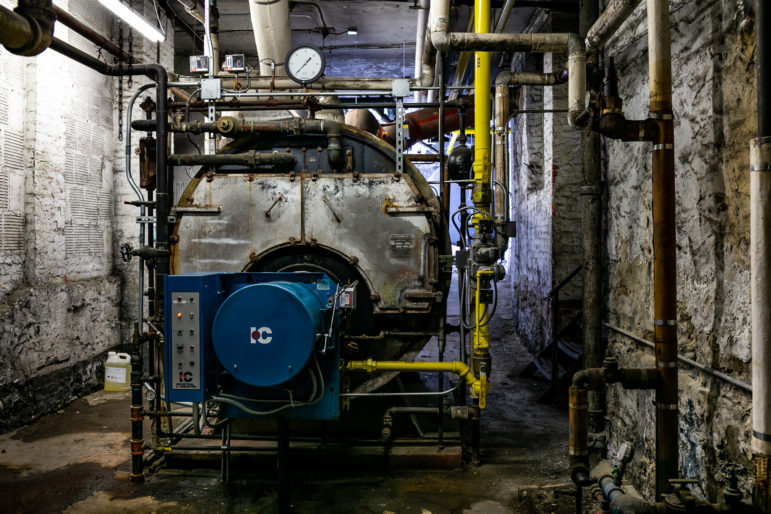‘Cleaning up our buildings in the decades to come isn’t just about creating thousands of good jobs, or combating environmental racism, or fighting climate change. It’s also about improving public health.’

Adi Talwar
A boiler. Local Law 97 would require landlords to ensure that heat is delivered efficiently to buildings.When I was a kid, there was nothing I wanted to do more than run, climb, and play outside with my friends. Growing up in Crown Heights in the ’80s, we didn’t have video games and Al Gore hadn’t “invented” the internet yet. So kids played in hallways, backyards, and on city sidewalks. Most of my time, however, was spent sitting on the sidelines. I had severe asthma, so I couldn’t run around like all of my friends without getting tired. Some of my favorite childhood memories involve the only two places in Brooklyn where I felt like I could actually breathe: Prospect Park and the Brooklyn Botanic Garden.
As a kid, it never occurred to me that my asthma might have a cause beyond genetics or, perhaps, bad luck. But as an adult, when I became deeply involved in the housing movement, I couldn’t help but connect the dots. Between half and three-quarters of a residential building’s energy use comes from burning fossil fuels, which emits hazardous air particles that can cause respiratory illnesses like asthma. All the hallmarks of bad housing—dampness, mold, pests, poor ventilation—are also linked to poor respiratory health, and, according to the Department of Health, Crown Heights has higher than average maintenance defects. The combination of dirty fuels and landlord neglect may explain why hospitalizations for children with asthma in Crown Heights are more than double the citywide rate.
It’s hard for me to stomach that the home that nurtured me for my whole life also very likely made me sick. It’s even harder to stomach that our governor—and the influential real estate lobby that backs him—want to undo the progress we’ve made to make our buildings cleaner by overriding the city’s landmark Local Law 97.
Reducing building pollution couldn’t be more important. Today in New York City, about 70 percent of climate-heating pollution comes from building energy use. And more than half of that pollution comes from the 5 percent of buildings in the city that are over 25,000 square feet. To have any chance of fighting the existential risk that climate change represents for our city—and improving the health of everyone who lives here—we need to address the city’s largest pollution source.
That’s why I was hopeful two years ago when Local Law 97 was enacted as part of the Climate Mobilization Act. The law requires owners of large buildings to make energy efficiency upgrades starting in 2024 that will cut climate-heating pollution 40 percent by 2030 and more than 80 percent by 2050. As it’s written, Local Law 97 is the most ambitious building emissions legislation enacted by any city in the world. Part of why I decided to run for City Council in District 35 was because I wanted to make sure we enforce that law properly—and expand it to cover residential and small buildings owned by wealthy landlords, like my own.
 CityViews are readers’ opinions, not those of City Limits. Add your voice today!
CityViews are readers’ opinions, not those of City Limits. Add your voice today!
The problem is, the real estate lobby—especially the Real Estate Board of New York (REBNY)—has never liked Local Law 97. In fact, they fought hard to block its passage two years ago. Now they’re trying to weaken it at the state level by pushing for the inclusion of Part R in the Transportation, Economic Development, and Environmental Conservation FY 2021 (TED) bill in Governor Cuomo’s Executive Budget. Part R would allow landlords to satisfy Local Law 97 by buying renewable energy credits from outside the city—giving them the wiggle room to leave their own buildings unchanged. This is no small amendment. In short, it would undermine the bill’s entire mission by allowing the city’s biggest polluters to keep polluting.
Cleaning up our buildings in the decades to come isn’t just about creating thousands of good jobs, or combatting environmental racism, or fighting climate change. It’s also about improving public health. Dirty, fossil fuel-run boilers and even gas stoves are dangerous for people like me with asthma. And at a time when COVID-19, a respiratory disease, is still devastating our communities, the foolishness of degrading our air quality here in the city should be obvious to our representatives in Albany.
For too long, we’ve had leaders in New York who are more interested in profit than the health of our people or the planet. That kind of leadership got us into a climate crisis, which presents a clear and present danger to our neighborhoods right here in Brooklyn. To get us out of it, we need to stand up to the landlords and developers standing in the way of change, and put power back in the hands of the working class communities of color that will experience the climate crisis first and most intensely.
The stakes of the climate crisis are global, but for so many of us, its consequences are deeply personal. Here in Crown Heights, it’s literally clogging up our lungs. It shouldn’t be that way. Nobody should have to suffer just because a few rich landlords are too greedy to get off fossil fuels. I have a very young niece and nephew who live here in the city, and I want them to be able to run and play without coughing and wheezing the way I did when I was a kid. They deserve the right to breathe. We all do.
Michael Hollingsworth is tenant organizer, lifelong Brooklynite and candidate for City Council in District 35.








